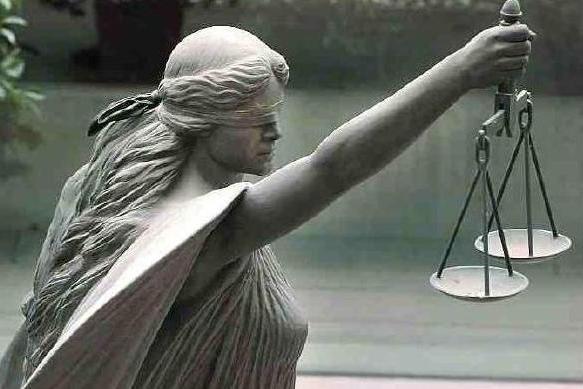Looking beyond the elections, the new government must ensure they change their lawyer.
One of the greatest issues of concern to the voters in Sunday’s general elections is the poor state of law and order, and rising crime rate and the administration of justice generally.
We have all heard about allegations that the crimes our friends and family suffer from are merely a perception. Well, to our minds, it’s very real. The police force and the Home Ministry must buck up, we say. Bring on the IPCMC, to ensure the police act professionally and properly we cry.
But at the end of the day, the main person in charge of bringing to justice perpetrators of crime is the Public Prosecutor. Under the Federal Constitution, the Attorney General is the Public Prosecutor and Tan Sri Abdul Gani Patail has held this post for more than a decade now.
The Attorney General’s main role is that of Public Prosecutor. His decision to prosecute (and not to prosecute) has been held by Courts (following old English common law) to be beyond judicial oversight. But in England, the Attorney General was traditionally a Member of Parliament and therefore accountable to the people for his prosecution decisions.
The second, and perhaps just as important role, of the Attorney-General is as principal legal adviser to the government. Numerous contracts are signed by the Government with companies, whilst multi national treaties are entered into on the world stage. Advice on the numerous long term multi billion ringgit contracts signed by the Federal Government in the last one or two years must be examined, and ways found to get out of those contracts if they are unprofitable or onerous to the rakyat.
As the principal legal adviser to the government, and the person in charge of bringing those accused of crimes to justice, the Attorney General must thus be multi-talented.
Thirdly, and less obviously, the AG leads the Judicial will shape the people who will most likely eventually become our judges. Most of Malaysia’s higher judiciary are recruited from officers from the Judicial and Legal Services, and the effective head of this combined service is the Attorney General.
When Dr Mahathir suspended 6 judges, and subsequently dismissed the Lord President Tun Salleh Abas and 2 other judges in 1988, the whole nation was shocked. The amendments to the Constitution that same year emasculated the judiciary at its very heart, with the Constitution amended to make the judiciary subordinate to an Executive controlled Legislature. Only now are the results of this being felt by Malaysians, and an entire generation of Judges have now been appointed after 1988 with this kind of mindset. I recall at one Malaysian Law Conference, a senior lawyer commented from the floor that Malaysian judges seem to view themselves as members of an administrative tribunal rather than as judges.
Things deteriorated after that, with perhaps our lowest point reached with Eusoff Chin and later Ahmad Fairuz as Chief Justice. We just have to remember V K Lingam’s influence in cases like Ayer Molek, and his holiday with Eusoff Chin in New Zealand. V K Lingam’s telephone call with Chief Justice Ahmad Fairuz about “fixing” judicial appointments resulted in a Royal Commission of Inquiry (“RCI”) which recommended that criminal proceedings be brought against those involved in fixing judicial appointments. But the Attorney General did not act on this, he instead closed investigations and did not take any action at all.
Many other cases where ordinary members of the public try to sue governments are objected to by the Attorney General who seems to act more as the mouthpiece and lawyer of the ruling government rather than as guardian of the public interest, causing me and other LoyarBurokkers to complain and appeal for an abolition of a rule that allowed the AG a special position to object to cases against the government. Alas, that did not happen and the AG’s powers remain vast.
Corruption in the administration of justice, and corruption in all aspects of public life in Malaysia, is also a very real problem. What happened to Teoh Beng Hock and Ahmad Sarbani Mohamed was very real and no mere perception. Even the Barisan controlled newspaper, The Star, recently referred to the influence of a retired judge with his colleagues on the Bench, and how cases could be “fixed”. Again, it would appear that no action has been taken by the Attorney General as Public Prosecutor.
AG must lead reform
The AG must thus be of impeccable integrity, and aware of his or her duty to uphold the rule of law and the democratic principles on which our constitutional system is founded.
Leading the reform of the judiciary and the administration of justice generally, while respecting its independence from a new government, should be the new Attorney-General. Whilst a new head of the MACC and a new Election Commission Chairperson are also critical, the role of the Attorney General is by far the most important.
All Malaysians expect Gani Patail, who has served 3 UMNO Prime Ministers, to resign when the elections results are announced in favour of a Pakatan government. As a leading member of a very small group of trusted officers in the Attorney General’s Chambers who have prosecuted (no, persecuted) Anwar Ibrahim since 1998, Gani cannot seriously expect to be advising a Pakatan government.
Although in the course of my work, I have met some dedicated, intelligent and honest people from the Attorney General’s Chambers, sadly I feel that everyone connected with Chambers would not be able to convincingly command the confidence and trust of the people as a whole. A completely change in leadership will help to ensure systemic problems are also addressed. The whole department needs substantial reform, and only an outsider can undertake it.
So who should be the new AG?
The first requirement, therefore, is that the new AG should not be a member or former member of the Attorney General’s Chambers. He or she should come from the Malaysian Bar, which has been a major independent institution in the country and has been in the forefront of the struggle for civil liberties.
The candidate must have integrity and honesty. His or her reputation and credibility must be unimpeachable. As the government and GLCs have entered into hundreds of contracts, some of them lop-sided, the new Attorney General must be very sound in civil and contracts law. The candidate must also be well versed in many areas of the law such as commercial law, civil liberties, constitutional, international trade and international law.
Thus, the new Attorney General must be an all-round lawyer who can lead the government’s case in Courts and tribunals both in Malaysia and internationally. Although the Attorney General is appointed by the Yang di-Pertuan Agong on the recommendation of the Prime Minister, the new Attorney General in a reforming government must be acceptable to all the 3 Pakatan parties, and to the people at large.
Additionally, numerous repressive Acts of Parliament must be repealed. New laws must be presented to Parliament. A reforming government, committed to transparency and accountability, must be willing to have any new laws presented for public debate before it is put forward in Parliament.
A new Attorney General must also lead the Chambers in drafting laws from a people’s perspective, with the interests of the people – and not the ruling government – at heart. This would be quite different from 55 years of UMNO law-making that the Attorney General’s Chambers is conversant with.
Because the Attorney General will be asked to perform so many tasks, he should be a member of the Cabinet or at least enjoy Cabinet ranking. He or she can therefore be a Member of Parliament or a Senator. At least 2 UMNO Attorney Generals, Tan Sri Kadir Yusof and Tan Sri Hamzah Samah were political appointees. Even if the new Attorney General is not a member of either House of Parliament, he or she must enjoy Cabinet status, so that he or she can attend all Cabinet meetings to advise the government properly before decisions are made.
As the role is going to be significant, after the Yang di-Pertuan Agong appoints our nomination, and he or she takes office, the new Attorney General must also be confirmed by the Dewan Rakyat after Parliament sits in the first session. We would like to set an example for future office-holders. Although they are effectively appointed by the Prime Minister, Parliament should approve the appointment.
Finally, we should not take into account race, religion or gender. Rather, it must be based on merit, so that Malaysia will have the benefit of the best available candidate willing to serve the nation.
Even if Pakatan does not win the elections, a BN that is serious about the need to reform itself should appoint a new Attorney General for all the above reasons.



Your post reminds me of someone i would no doubt good to be one…..Dato Ambiga…
Dato' Shafee Abdullah?
Bersih just wants clean elections, not to bring down any govt. But if the govt helped to bring in phantom voters, extra ballot boxes with fake votes, that govt then is afraid of bersih. They have evidence to show, while you have none.
o
Ambiga is an unmitigated liar, a racist and a treasonous pimp of the opposition.
Anything she has done has been to further her own causes and not those of her
client the opposition.
Ambiga sought and obtained funds from an opposition state government who did not give
her those funds through the proper processes of law required of a state government when
making payments out of state funds. remember these ar the funds of the people and not of individuals
in government.
Whats more disturbing is that she used those funds to try to bring down a properly elected government
at the Federal level. In lesser jurisdictions they take people like her to the wall the very next day and shoot them.
You now not only want to end corruption you blame on government but also want her to be the next Ag without her having been elected or contributed in any positive way to the nations security and advancement.
Nice!
The current AG is a deadwood in bed with the corrupt politicians. Even if PR wins the election, there are constitutional procedures to be followed for dismissal unless he resigns. Theory is one thing, the practicality of dismissing him or compelling him to resign is another. If he has any integrity which I doubt he has, he will resign on his own volition. If BN wins and continues to govern, then God help Malaysia because the corrupted system will continue unabated. There is not too many persons with integrity left in government, alas!
I like your absolute optimism !.. " when the elections results are announced in favour of a Pakatan government". However in the same sense your optimism that BN if re elected will/may 'suddenly see the evil of its ways' and change the AG really moves from optimism to fantasy!!!.
What great fodder the above info is for change. Why isn't all this great material being exploited to its hilt to show that all is not well beneath the shimmering glass towers and RM100 handouts that the Govt of the day seems to exhibit as proof of its 'golden era'?.
Or are these not significant enough to people at large whose lives are buried in larger needs.? Or have we, like the often quoted frog, comfortable in water slowly brought to boil, just been immersed in the crap so long that we no longer see it all around us?. Keep up the good fight!!.
Dato Ambiga , It MUST BE
Your post reminds me of someone i would no doubt good to be one…..Dato Ambiga…